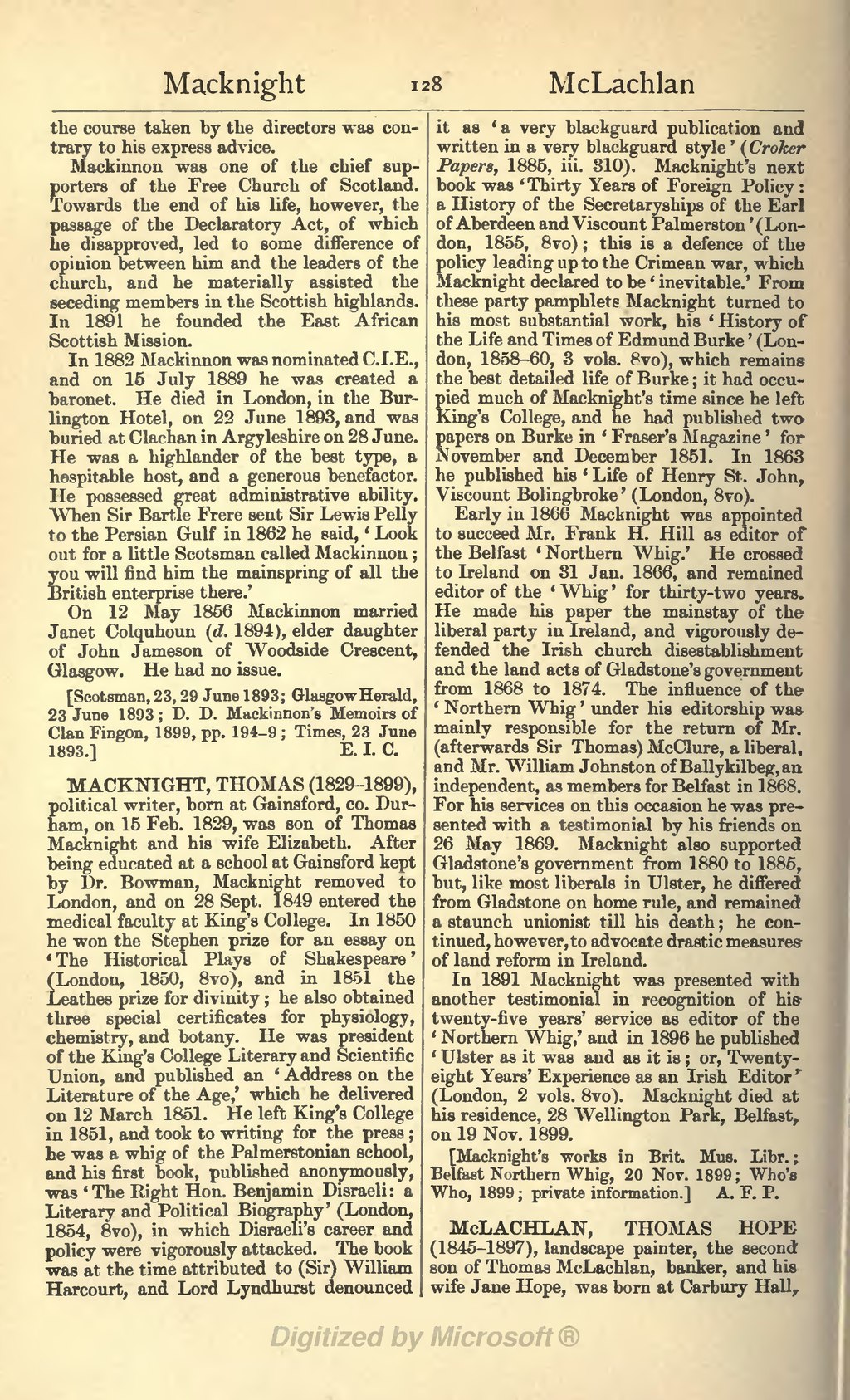the course taken by the directors was contrary to his express advice.
Mackinnon was one of the chief supporters of the Free Church of Scotland. Towards the end of his life, however, the passage of the Declaratory Act, of which he disapproved, led to some difference of opinion between him and the leaders of the church, and he materially assisted the seceding members in the Scottish highlands. In 1891 he founded the East African Scottish Mission.
In 1882 Mackinnon was nominated C.I.E., and on 15 July 1889 he was created a baronet. He died in London, in the Burlington Hotel, on 22 June 1893, and was buried at Clachan in Argyleshire on 28 June. He was a highlander of the best type, a hospitable host, and a generous benefactor. He possessed great administrative ability. When Sir Bartle Frere sent Sir Lewis Pelly to the Persian Gulf in 1862 he said, 'Look out for a little Scotsman called Mackinnon; you will find him the mainspring of all the British enterprise there.'
On 12 May 1856 Mackinnon married Janet Colquhoun (d. 1894), elder daughter of John Jameson of Woodside Crescent, Glasgow. He had no issue.
[Scotsman, 23, 29 June 1893; Glasgow Herald, 23 June 1893; D. D. Mackinnon's Memoirs of Clan Fingon, 1899, pp. 194–9; Times, 23 June 1893.]
MACKNIGHT, THOMAS (1829–1899), political writer, born at Gainsford, co. Durham, on 15 Feb. 1829, was son of Thomas Macknight and his wife Elizabeth. After being educated at a school at Gainsford kept by Dr. Bowman, Macknight removed to London, and on 28 Sept. 1849 entered the medical faculty at King's College. In 1850 he won the Stephen prize for an essay on 'The Historical Plays of Shakespeare' (London, 1850, 8vo), and in 1851 the Leathes prize for divinity; he also obtained three special certificates for physiology, chemistry, and botany. He was president of the King's College Literary and Scientific Union, and published an 'Address on the Literature of the Age,' which he delivered on 12 March 1851. He left King's College in 1851, and took to writing for the press; he was a whig of the Palmerstonian school, and his first book, published anonymously, was 'The Right Hon. Benjamin Disraeli: a Literary and Political Biography' (London, 1854, 8vo), in which Disraeli's career and policy were vigorously attacked. The book was at the time attributed to (Sir) William Harcourt, and Lord Lyndhurst denounced it as 'a very blackguard publication and written in a very blackguard style' (Croker Papers, 1885, iii. 310). Macknight's next book was 'Thirty Years of Foreign Policy: a History of the Secretaryships of the Earl of Aberdeen and Viscount Palmerston' (London, 1855, 8vo); this is a defence of the policy leading up to the Crimean war, which Macknight declared to be 'inevitable.' From these party pamphlets Macknight turned to his most substantial work, his 'History of the Life and Times of Edmund Burke' (London, 1858-60, 3 vols. 8vo), which remains the best detailed life of Burke; it had occupied much of Macknight's time since he left King's College, and he had published two papers on Burke in 'Fraser's Magazine' for November and December 1851. In 1863 he published his 'Life of Henry St. John, Viscount Bolingbroke' (London, 8vo).
Early in 1866 Macknight was appointed to succeed Mr. Frank H. Hill as editor of the Belfast 'Northern Whig.' He crossed to Ireland on 31 Jan. 1866, and remained editor of the 'Whig' for thirty-two years. He made his paper the mainstay of the liberal party in Ireland, and vigorously defended the Irish church disestablishment and the land acts of Gladstone's government from 1868 to 1874. The influence of the 'Northern Whig' under his editorship was mainly responsible for the return of Mr. (afterwards Sir Thomas) McClure, a liberal, and Mr. William Johnston of Ballykilbeg, an independent, as members for Belfast in 1868. For his services on this occasion he was presented with a testimonial by his friends on 26 May 1869. Macknight also supported Gladstone's government from 1880 to 1885, but, like most liberals in Ulster, he differed from Gladstone on home rule, and remained a staunch unionist till his death; he continued, however, to advocate drastic measuresof land reform in Ireland.
In 1891 Macknight was presented with another testimonial in recognition of his twenty-five years' service as editor of the 'Northern Whig,' and in 1896 he published 'Ulster as it was and as it is; or, Twenty-eight Years' Experience as an Irish Editor' (London, 2 vols. 8vo). Macknight died at his residence, 28 Wellington Park, Belfast, on 19 Nov. 1899.
[Macknight's works in Brit. Mus. Libr.; Belfast Northern Whig, 20 Nov. 1899; Who's Who, 1899; private information.]
McLACHLAN, THOMAS HOPE (1845–1897), landscape painter, the second son of Thomas McLachlan, banker, and his wife Jane Hope, was born at Carbury Hall,
